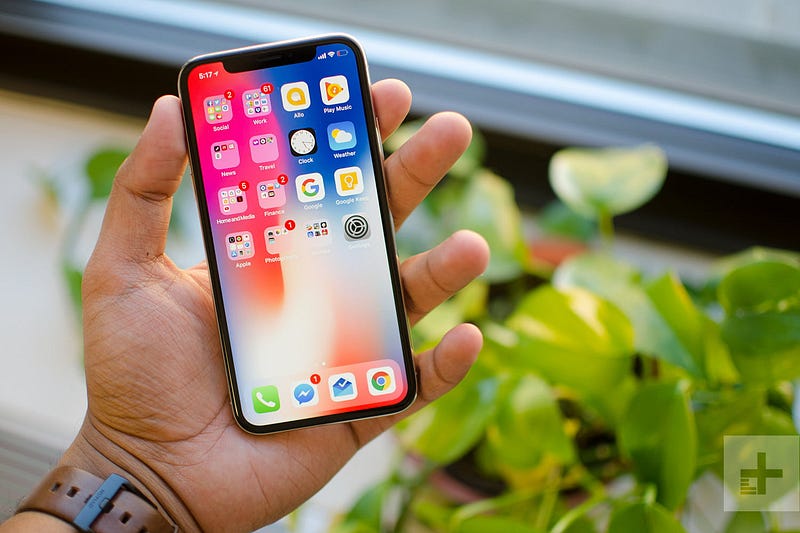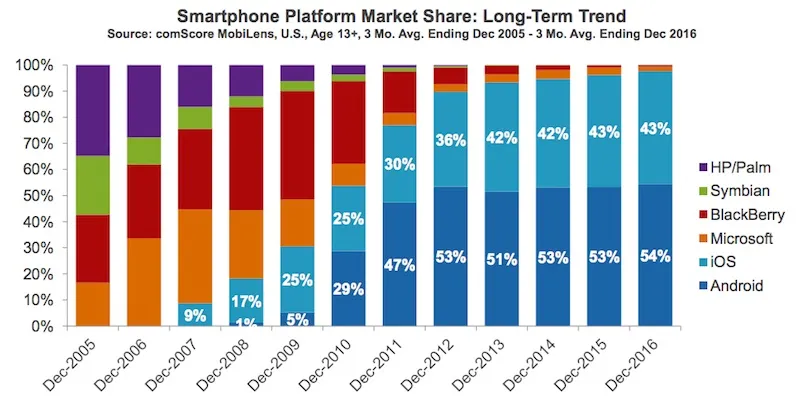Last Updated on September 1, 2023 by David
A look at why Apple’s iPhone X will continue to excel amidst a smartphone revolution.

1. Empathy — We will truly understand their [customer] needs better than any other company.
2. Focus — In order to do a good job of the things we decide to do, we must eliminate all of the unimportant opportunities.
3. Impute — People DO judge a book by its cover. We may have the best product, the highest quality, the most useful software, etc.; if we present them in a slipshod manner, they will be perceived as slipshod; if we present them in a creative, professional manner, we will impute the desired qualities.
These are the 3 pillars of Apple’s business, product, and marketing philosophy.
By now we’ve probably all held and have watched reviews of Cupertino’s latest and greatest. The 10th generation (or 11th or 12th depending on how you count) iPhone X. But let’s get one thing out of the way first: the iPhone X is not a flagship phone of all phones; it’s Apple’s flagship phone. And that’s where Apple really wins. The iPhone X isn’t a phone for everyone because there are truly greater phones out there like the OnePlus 5T, the Google Pixel 2 XL, the Samsung Galaxy Note 8, and the list goes on. It doesn’t even nearly compare in terms of features or technology. And while the iPhone X isn’t a “great” phone in terms of specs (or is it), much can be said about it being a “better” experiential phone than any of the competitors.
There are now over an estimated 85.8 million iPhone owners aged 13 and older in the United States, based on a three-month average ending December 2016. — comScore MobiLens Plus.
Apple’s understanding of its core customer base is lightyears ahead of its competitors like Samsung, Huawei, or even Google. Actually, “understanding” is a underestimation of the right word. A lot of companies understand what it takes to achieve the same thing, but they haven’t put in the long term investments necessary to execute. For example, building teams, factories, pipelines, to produce the perfect product. They’ve invested a lot of upfront effort to get to where they are and it’s a real moat that is hard to bridge.
We all know that while others compete with (and make fun of) Apple on technology like processor speed, memory capacity, screen resolution, and battery, Apple brushes those aside and continues on an upgrade path unique to itself and its customers. To understand Apple and its philosophy, one doesn’t need to venture much farther than its retail stores. From the immaculate layout of store designs to its layout of product lineups and from its uniform dress code to exemplary customer service, one can really see and feel how much of a people-company Apple really is. The same can’t be said about Samsung, Huawei, or Google.
 It’s important to note that iOS market share is represented by one device family, the iPhone while Android market share is represented by more than 20 device families from dozens of manufacturers.
It’s important to note that iOS market share is represented by one device family, the iPhone while Android market share is represented by more than 20 device families from dozens of manufacturers.There are now more than 700 million iPhones currently in use worldwide. — BMO Capital Markets
Being a people-company isn’t easy (which is also an underestimation). It takes decades of long term analysis, planning, and execution with pinpoint accuracy. You see, unlike Samsung or Huawei, Apple does not see its devices as devices but rather individual pieces in a much larger pattern of your life’s work and your family’s life work. Its devices don’t just encapsulate a fragment of what you do from day to day but is designed to be a continuum. And when you buy an Apple product, it’s Apple’s responsibility to make sure your loved ones including your spouse, children, parents, and grandparents share an equal responsibility in carrying on that continuum. These are insanely lofty goals for any company and Apple is the only company that I know of that can do it so well at so much scale.
iPhone is the most popular smartphone in both the United States and the world. — Kantar Worldpanel and IHS Markit
Let’s take another look at Samsung. It’s a powerhouse of a company. But even as Apple’s largest competitor, it doesn’t nearly have enough of a story. Who is Samsung? To many Apple evangelists, that was Steve Jobs and now, Tim Cook. What other products does Samsung produce? Outside of refrigerators and maybe the Samsung Gear smartwatch, you’d be hard-pressed to easily identify another Samsung product. Where do you go for Samsung support? Another mind-bender. The list goes on. It’s much easier to say that Samsung’s Galaxy Note 8 is a greater phone because of the specifications than it is to say the Samsung family of products offers a better experience than Apple’s.
Experiences (of all types) matter
They do. And Apple understands this better than anyone. While Android operating systems vary from manufacturer to manufacturer and from year to year, Apple’s iOS is unremarkably similar with every generation and in every device. That same experience carries through its entire product lineup from iPads to Macbooks and from Apple TVs to Apple Watches. But interface-interaction and physical-interaction experiences are just the beginning. The purchasing, shipping, customer support, developer support, returns, and retail store experiences are consistent as well, never deviating from a path often traveled on. This is, in no small part, a result of Apple’s understanding of its customer base. With over 700 million iPhones in use today, the iOS experience becomes sacred. Because, you know, your grandparents’ experiences matter too.
Takeaway: Don’t just focus on the core experience your product offers. Think about your customers’ entire experience from marketing to post sales support.
Ecosystems matter
Apple’s ecosystem is most often referred to as the iTunes Apps Store. It’s ecosystem of cross device and cross platform apps with family sharing is also just tip of the iceberg. Once you take into account of Apple’s iMessage, FaceTime, iCloud (with photo and document sharing), Music, Movies, and even Airdrop, this ecosystem extends far beyond just apps. It’s an ecosystem for your friends and family. It’s rare to see a company this devoted to making sure you and your family stay together. And while Apple isn’t perfect, it’s far more perfect than Samsung or Huawei.
The only other contender in this respect is Google with its full suite of Google apps. However, Google’s ecosystem, while plentiful, are not as refined as Apple’s. Moving from device to device is not fluid. The robustness of Apple’s ecosystem is controlled tightly by Apple because it has far-reaching understanding of its user base — that Apple devotees want to be limited in what they can do because it’s simpler, safer, more reliable, and guaranteed to work. It’s always easier to be able to do more (more tech, more features, more apps, more of everything) than it is to do more with less.
Takeaway: Your customers don’t always want more features. They want refinement, consolidation, consistency, and being able to more with less. Building your product (whether digital or physical) depends on your ability to decipher what’s core and what’s fluff.
None are too far removed from the previous generation
Apple exhibits a level of control, self-regulation, and simplicity that is difficult to grasp and understand. We already know that Apple excels because it controls its software and hardware but Apple’s success must be measured by looking beyond code, algorithms, and design. Many claim that hardcore Apple fans merely overlook Apple’s shortcomings because they’re fans. What many don’t seem to understand is why Apple fans are fans in the first place. Apple’s marketing is one of tradition, lifestyle, and a dedication to one company’s (and many one person’s) philosophy. And no matter how people try to paint Apple as a “religion”, it simply isn’t. It’s a world class company that understands its user base, markets to them effectively, and creates consistent products that align to each and every one of their needs.
Apple represents a stark contrast to other tech companies like Google or Samsung. Apple is a company with an identity and personality. These traits might not be loved by all but certainly loved and revered by many. If you ask individuals who love their phones like iJustine, I’m sure you’ll get more than what you asked for.
Takeaway: Find a philosophy, stick to it with all you go, and attract a loyal fanbase who agrees with that philosophy. You’re not trying to sell your product to the whole world but maybe, just maybe, the whole world will somehow agree with you in the end.
It’s always easier with Apple (and always more expensive)
People who buy Apple products understand one thing very well: it’s easier. Apple products are notoriously easy.
- Easier for older generations to use
- Easier for parents to set perimeters and control over their childrens’ devices
- Easier for busy business people who just need something to work
- Easier for the non-techy
- Easier for teens because all their friends already use an iPhone
- Easier to buy, return, service, and get support
But this level of easiness comes at a cost. For the iPhone X, that’s somewhere north of $1,200. When higher spec-ed phones come in at half that, surely Apple must be crazy. When YouTube stars like Lu from Unbox Therapy releases videos like this one:
the Anti-Apple crowd goes crazy because he makes such a good argument: the iPhone X is twice as expensive but it’s definitely not twice as good.
What Lu doesn’t cover is the price of the experience. When you can only obtain the experience of an iPhone X from a company like Apple, the cost of entry is priced accordingly.
Takeaway: a unique and refined experience is justification for the price of entry, whatever that may be. Don’t be afraid to charge what you feel is right if your customers are getting the experience the paid for.
This article was not produced because we’re Apple evangelists. We have all sorts of devices here at Re:amaze. We produced this article because the iPhone X is such a daring product in today’s smartphone marketplace. There is no shortage of tech-touting smartphones to pick from. And yet, Apple continues its course in developing a product fit for their customers.
The iPhone X is not the best smartphone by all possible considerations (unlike say during the iPhone 3GS days when it was clearly head and shoulders above everyone else). However, Apple’s transition from being “clearly the best” to “arguably better” is an interesting case study while maintaining market position. The iPhone X is a distillation of Apple’s philosophy and devotion to understanding customers. It’s an exercise in going against the grain and not betraying a loyal customer base who’s invested in all of its successes and failures.
There’s a lot to be learned from Apple despite how you might personally feel about the company and we haven’t really done it justice. If you’re interested in learning more about Apple and why some see it as religion, feel free to check these books out.
Interested in what else we have to say? Make sure to recommend this article by clicking the heart and follow us for more stories about startup life, customer service, and tips on treating customers right.
You can also find our multi-brand, multi-channel customer service platform at https://www.reamaze.com. Follow @reamaze.
